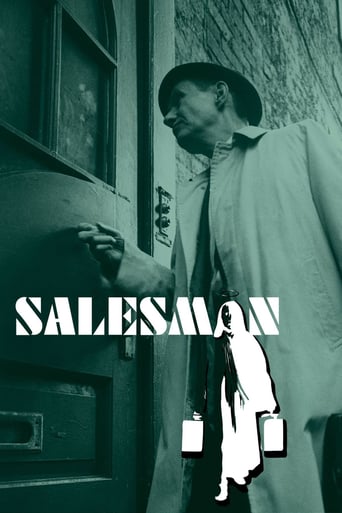gavin6942
Four relentless door-to-door salesmen deal with constant rejection, homesickness and inevitable burnout as they go across the country selling very expensive bibles to low-income Catholic families.The Maysles brothers decided they wanted to be the first to make a nonfiction feature film (which turned out to be "Salesman") after learning that Truman Capote had made the claim that his newly released book "In Cold Blood" was a nonfiction novel. The film was made on a low budget; just under seven minutes into the film, one of the two cameras used can be seen in the shot. The hand-held microphone used to record the film's sound is visible in other shots.When Salesman was completed, there were challenges in showing the film. As the Maysles brothers tried to get distribution, they were told that the content was too depressing and realistic for the public. Indeed, there are depressing aspects. But even more, this tells me two things: one, it is no surprise that door-to-door salesmen have died out, because this approach is pretty awful, forcing people to purchase something they do not want and cannot afford.But what is even stranger is the sale of the Bible. $40 for a Bible in the 1960s? I feel like any corner bookstore would have sold one for under $5 easily, and didn't most people already own one? And then you see these men interacting away from customers, and they are rather coarse men, not what you might call the most principled Christians. Is this right? Pushing of the Bible by people who clearly are not strict adherents?
Gethin Van Haanrath
A 1969 documentary about a group of salesman selling bibles to the masses. It's probably most interesting because you see how people lived and worked 40 years ago. The salesmen themselves are interesting but so are the people they meet. Of course they use every trick in their book to sell their bibles ("Did I tell you I'm an Irish catholic?"). Very interesting to see how these men worked in a job which is now very much gone. Alone on the road they share their misery and failings with their fellow salesmen who yawn and offer some half-hearted advice.Salesman is a real version Glengary Glen Ross 25 years before that movie was made. What we have here is a time capsule of 1969. The decorations in the homes, the clothing, the cars, the way they talk, it's all pretty dated by today's standards. But it's interesting to see how people lived in 1969.
tonyinjapan
Every time I see a documentary I wonder about the editing process - the choice of what we were *allowed* to see, and the order in which we are permitted to see it. I have the same feeling with "Salesman", but in this case it's what we get to hear. At times it seems like the audio has beenpost-recorded, rather than what was spoken on the spot. It may have had something to do with the sound recording equipment that they were using, but some dialogue clearly does not have the same acoustic quality as other piece of dialogue in the same scene. While most of the dialogue is influenced by the environments in which the participants speak (home, on the road, motel room), some dialogue sounds like it was produced in a neutral environment, like a studio.Point in case is when Paul is dissecting the day in his motel room with his roommate (19 minutes in). Paul steps into the bathroom and his speaking continues. However, given that he was most likely going to the bathroom to relieve himself, we get a dialogue free of bathroom noise, and one that was most likely re-recorded at another time in another location (this might have been so that people's 1969 sensibilities weren't offended). Now, this is clearly a manipulation of reality, which distracts from the 'real' nature of documentary - and, of course, documentaries are what the documentarians allow us to see/hear. This is not intended to devalue the movie for me , but it does serve as a reminder that documentaries are not as 'real' as many believe them to be.In any respect, I'd love to know what became of these guys. I watched a version of Salesman without any such information. Does anybody know?
Polaris_DiB
he Maysles brothers depict what it's like to be in the middle of an uncomfortable salesman situation from both sides, over and over and over and over again. In the meantime, they explore the nature of salesmanship, it's ties with the American Dream, and also the irony of being a Bible salesman and a Catholic. It's good, but it's not really pleasant viewing anyway you stretch it, and for anyone who's been a salesman or had to deal with them (i.e., the majority of everybody), it brings up some bad memories.As a movie made under the Maysles' "direct cinema" approach, it's very successful: finding a narrative in the real-life records, making a nonfiction that doesn't call itself documentary. This movie is certainly a very interesting exploration of editing and form, especially as concerns the scene of traveling on the train, where the two brothers literally put thoughts into the character's head via flashbacks.--PolarisDiB

